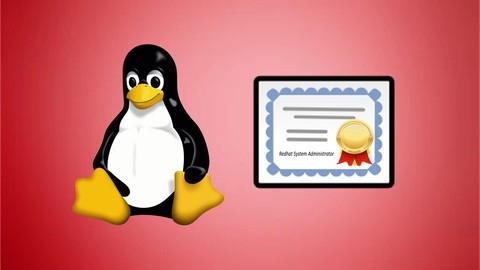Linux Red Hat Certified System Administrator (RHCSA) is a valuable certification for those wanting to pursue a career in Linux system administration.
Obtaining this certification demonstrates mastery of essential skills for managing Red Hat Enterprise Linux (RHEL), the industry-leading enterprise Linux distribution.
Learning RHCSA equips you with the knowledge and skills to install, configure, and manage RHEL systems, making you a highly sought-after candidate in the competitive IT job market.
Finding the right RHCSA course on Udemy can be challenging.
There are many courses available, but choosing the best one for your needs can feel overwhelming.
You want a course that’s comprehensive, engaging, and taught by experienced instructors, and ideally, it should also be tailored to your learning style and goals.
For the best RHCSA course overall on Udemy, we recommend Linux Redhat Certified System Administrator (RHCSA - EX200).
This course is highly rated and comprehensive, providing a strong foundation in RHEL 8 and 9, covering essential skills needed to confidently navigate both versions.
The course is structured in two modules mirroring the official Red Hat curriculum and includes hands-on practice with the command line, storage management, SELinux configuration, and containerization.
While this is our top pick, other great options are available on Udemy, catering to various learning styles and skill levels.
Keep reading to explore our recommendations for the best RHCSA courses for beginners, intermediate learners, and those seeking advanced training.
Linux Redhat Certified System Administrator (RHCSA - EX200)
This RHCSA course offers a comprehensive approach to mastering Red Hat Enterprise Linux administration, covering essential skills needed to confidently navigate both versions 8 and 9.
The course is structured in two modules, mirroring the official Red Hat curriculum.
You’ll get hands-on experience with the command line in RH124, developing proficiency in managing files, users, groups, processes, and configuring SSH.
In RH134, you’ll delve into advanced topics like storage management, SELinux configuration, and containerization.
What sets this course apart is its focus on practical application.
You’ll gain familiarity with key tools like Putty, VMWare Workstation Player, and Oracle VirtualBox, essential for real-world system administration tasks.
You’ll also learn the intricacies of networking concepts like NFS and Samba, enabling you to manage files across diverse systems.
This course is a valuable resource for anyone seeking to prepare for the EX-200 certification exam.
The comprehensive syllabus, combined with hands-on practice, provides a strong foundation for successfully navigating the demands of modern system administration in Red Hat environments.
Ermin Kreponic’s Course for CentOS and Red Hat Linux - RHCSA
This comprehensive Linux course equips you with the knowledge and skills to navigate the world of Red Hat and CentOS.
You’ll embark on a journey that starts with the fundamentals, guiding you through installing either Red Hat or CentOS using a virtual machine.
The course’s hands-on approach, utilizing VirtualBox, provides a safe space for experimentation without impacting your existing system.
You’ll delve into the core of Linux interaction, mastering both the graphical user interface and the command line.
From navigating the file system with commands like ls, cd, and pwd to finding files with find and locate, and managing permissions with chown and chmod, you’ll gain a solid foundation in essential Linux commands.
The course then takes you deeper, exploring package management with Yum and Rpm.
You’ll learn how to install, update, and remove software packages efficiently.
You’ll also be introduced to powerful techniques like globbing, input/output redirection, and the Vim text editor, allowing you to work with files effectively.
Moving beyond the basics, you’ll delve into user and group management, network configuration, and secure connections using SSH.
You’ll learn how to create and manage users and groups, set up network interfaces, and establish secure connections with SSH.
You’ll also gain expertise in partitioning and file systems, including creating and managing logical volumes using LVM.
Finally, you’ll explore server installation and configuration, setting up essential servers like Apache, FTP, and VNC.
You’ll learn how to install and configure a web server, an FTP server for file transfers, and VNC for remote desktop access.
The course concludes with an introduction to SELinux, a security enhancement for Linux, providing you with a foundational understanding of its workings.
This well-structured course provides a thorough foundation in Red Hat and CentOS, encompassing both fundamental concepts and advanced server administration.
Complete Red Hat System Administration Boot Camp - RHCSA 9
This course offers a comprehensive and hands-on approach to mastering Red Hat Enterprise Linux 9, equipping you with the skills needed to become a Red Hat Certified System Administrator (RHCSA).
You’ll appreciate the course’s focus on practical application.
You’ll get your hands dirty installing and configuring RHEL 9 across various platforms, including VMware Fusion, VirtualBox, and Microsoft Azure.
This experience will not only familiarize you with real-world scenarios but also prepare you for the challenges of the RHCSA certification exam.
Beyond the fundamentals, the course delves into essential areas like users and groups management, network configuration, and security.
You’ll learn to work with powerful tools like Systemctl for service management, Cron Jobs for automating tasks, and Podman for container management.
One aspect that truly sets this course apart is its emphasis on storage techniques.
You’ll gain a strong understanding of LVM, file systems, and remote file systems with NFS – crucial skills for any Linux administrator.
The inclusion of Bash shell scripting is a welcome addition, enabling you to automate tasks and efficiently troubleshoot system issues.
While the course does a good job covering the RHCSA exam objectives, you might find the pace of instruction could be adjusted for those with prior Linux experience.
However, the wealth of practical exercises and real-world scenarios more than makes up for this.
RHCSA Exam Training by Infinite Skills
This Red Hat Certified Systems Administrator training course from Infinite Skills offers a comprehensive and well-structured approach to mastering the intricacies of Red Hat Enterprise Linux (RHEL).
You’ll begin by diving into the fundamental building blocks of the Linux world, learning essential shell commands, user management techniques, and file manipulation skills.
This foundational knowledge will equip you with the tools necessary to confidently navigate the RHEL environment.
As you progress, you’ll delve into system management, gaining a deep understanding of booting, rebooting, and managing network services.
You’ll explore the critical aspect of package management, empowering you to effectively install, update, and maintain software on your RHEL systems.
Storage management is also thoroughly covered, ensuring you grasp the intricacies of partitions, file systems, and volume management, enabling you to optimize your system’s storage capacity.
You’ll embark on a journey into server management, learning how to configure networking, DNS resolution, and time services.
You’ll encounter essential services like HTTP and FTP, mastering their configuration and management.
Furthermore, you’ll discover how to utilize the LDAP server for user management, a crucial skill for managing larger and more complex systems.
The course extends its reach to encompass virtual machines, guiding you through the process of installing and managing RHEL as a virtual guest.
You’ll learn to launch virtual machines at boot and connect to their consoles, opening up a world of flexibility and scalability.
Finally, you’ll dive into security, exploring powerful tools like IPTables and SELinux, the guardians of your system against potential threats.
You’ll learn to craft firewall rules, configure SELinux modes, and master the intricacies of file and process contexts, building a solid foundation for securing your RHEL environments.
This course is a valuable resource for anyone aspiring to become a Red Hat Certified Systems Administrator (RHCSA).
The structured curriculum, combined with clear explanations and practical examples, will guide you towards mastery of RHEL.
Prepare for RHCSA Exam with Practice Course(EX200-RHEL 9)
This course offers a comprehensive and practical approach to preparing for the Red Hat Certified System Administrator (RHCSA) exam.
You’ll find yourself fully immersed in the world of Red Hat Enterprise Linux 9, learning the essential skills needed to confidently tackle the EX200-RHEL 9 exam.
Right from the start, you’ll be introduced to a well-structured lab environment, built upon Oracle VirtualBox.
The course provides a preconfigured IPA Server, offering essential services like DNS, LDAP, and NFS, allowing you to practice real-world scenarios in a controlled setting.
You’ll learn how to download and install the RHEL 9 virtual machine, even getting a step-by-step guide on configuring the IPA Server itself.
The course’s syllabus delves into the core RHCSA skillset.
You’ll learn how to manage user accounts and groups, master filesystems, and deploy, configure, and maintain systems with confidence.
You’ll gain fluency in using systemd units, scheduling cron jobs, and managing packages using DNF.
The course also emphasizes practical tools like find, grep, and tar, making you a master at navigating and managing files.
Security is addressed in detail, with sections on setting up firewall rules using firewalld and configuring SSH for secure access.
You’ll also learn about deploying and managing containers using podman, a critical skill in today’s cloud-native world.
The course rounds out with an in-depth exploration of system logging, log analysis, and troubleshooting.
Beyond the standard RHCSA objectives, the course includes a valuable section on installing and configuring a FREE IPA Server.
This is a fantastic addition as it introduces you to a powerful open-source solution for managing identity and access.
While the course excels in its practical approach and comprehensive syllabus, you might consider the benefits of supplementing the material with additional resources, depending on your individual learning style and background.
You’ll gain valuable hands-on experience, a solid understanding of RHEL 9 technologies, and a springboard into the world of Linux system administration.
Red Hat Enterprise Linux RHEL 9, RHCSA and RHCE
You’ll dive deep into essential tools, configuration of local storage, user and group management, and security best practices.
The inclusion of container technology, a rapidly growing area, is a welcome addition.
The curriculum goes beyond basic administration, covering both the RHCSA and RHCE certifications.
You’ll gain a solid understanding of Ansible, a powerful automation tool, through its core components and practical applications.
Learn how to build playbooks, leverage modules, manage roles, and utilize vaults for effective infrastructure management.
The course also includes a thorough exploration of bash scripting.
You’ll master essential concepts like variables, conditions, functions, and loops, culminating in a hands-on project to solidify your skills.
The final section prepares you for Red Hat exams, providing insights into the RHCSA and RHCE assessments.
Practice questions are included to enhance your exam readiness.
This course provides a solid foundation for anyone seeking to become a proficient RHEL administrator.
The inclusion of Ansible and bash scripting adds valuable skills to your repertoire.
However, it’s important to note that this is an introductory course; further exploration of specific topics may be required for advanced skill development.
RHCSA on RHEL 8: From Novice to Pro
Whether you’re starting from scratch or have some basic Linux experience, this course provides a solid foundation for your journey.
You’ll begin with the essentials: installing RHEL 8, navigating the terminal, and understanding the Linux file system.
You’ll dive into essential commands like grep, sed, and vim, learning how to efficiently manipulate text files.
The course then moves on to critical system administration tasks, such as configuring networking, setting up a firewall, and managing users and groups.
You’ll gain a deep understanding of system processes and memory management, along with mastering package management using yum.
The course also delves into systemd, the powerful system for managing services, and introduces you to scheduling tasks with cron and managing logs with rsyslog and systemd-journald.
Beyond the basics, you’ll explore advanced storage technologies like LVM and Stratis, and gain hands-on experience with containerization using Podman.
The course culminates with a section on shell programming, where you’ll learn to write scripts using the bash shell, using variables, conditional statements, loops, functions, and regular expressions.
RHCSA Training Class RHEL7
This RHCSA Training Class RHEL7 course is designed to help you conquer the Red Hat Certified System Administrator (RHCSA) exam.
The course creator recognizes the challenge many face with this exam and has tailored the content to give you the best possible chance of success on your first attempt.
You’ll be guided through the process of installing and configuring Red Hat Enterprise Linux 7 (RHEL 7) servers and clients.
The course covers essential topics like kickstart files, system updates, and network configuration – all crucial for RHCSA certification.
While you won’t be setting up virtual machines yourself, the instructor provides detailed explanations of the process, which is essential for understanding how RHEL 7 systems are built.
The training emphasizes hands-on practice, which is key to mastering these skills.
You’ll work through a variety of practical exercises covering topics like server and client installation, managing updates with Red Hat Network (RHN), and using kickstart files to automate system installations.
You’ll also get a feel for the exam format through practice questions and receive valuable tips on tackling the real test.
While a practice exam isn’t currently included, the course creator promises it will be added in a future update.
While the course doesn’t guarantee you’ll pass the RHCSA exam, the instructor stresses the importance of practice.
You’ll need to dedicate time to working through the exercises and use the course content as a foundation for your learning.
The instructor recommends using a Red Hat-based distribution, like Fedora, CentOS, or even RHEL itself, for your practice.
They explain how to obtain a free 30-day developer version of RHEL, making it accessible for you to start practicing immediately.
Remember, the key to success is consistent practice and utilizing the knowledge you gain from this comprehensive course.
You’ll be well-equipped to confidently face the RHCSA exam and achieve your certification goals.








